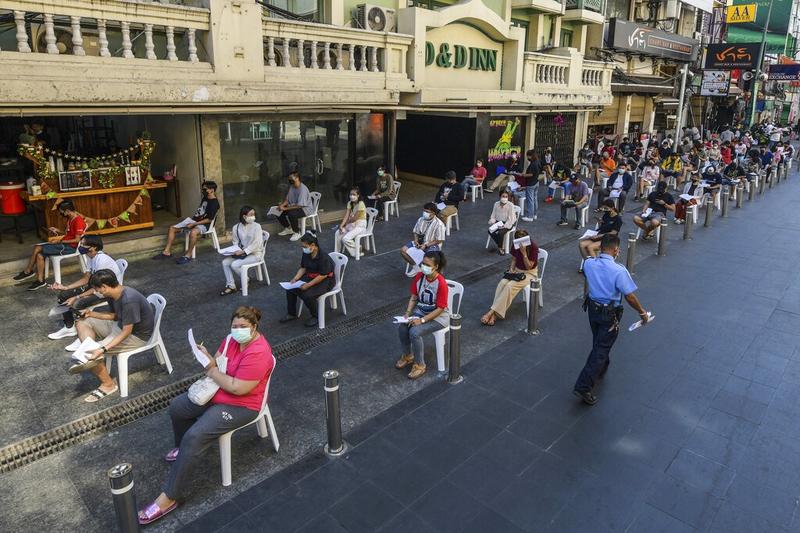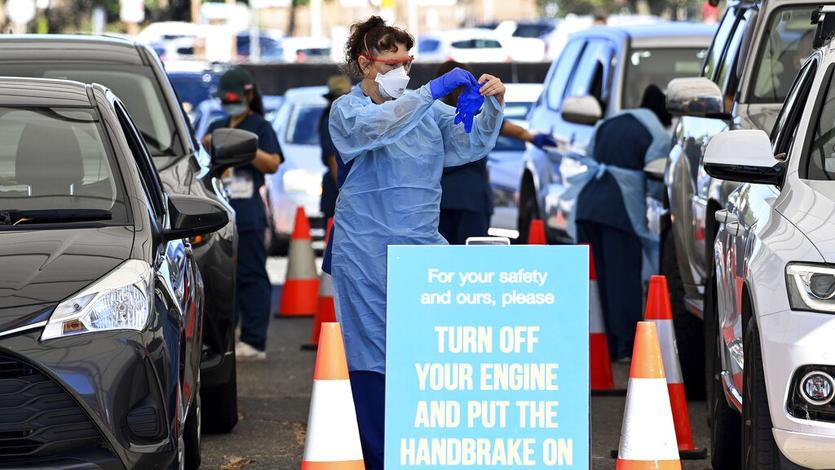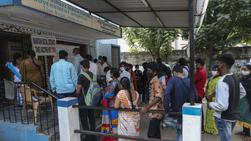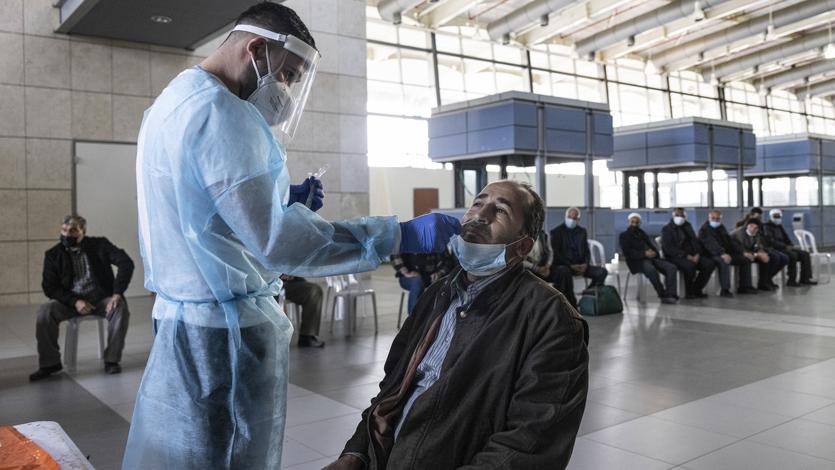 Workers wear face masks and practice social distancing while they wait to be tested for the coronavirus in Bangkok on Jan 6, 2022. (VICHAN POTI / AP)
Workers wear face masks and practice social distancing while they wait to be tested for the coronavirus in Bangkok on Jan 6, 2022. (VICHAN POTI / AP)
MANILA / ISTANBUL / KUALA LUMPUR / JERUSALEM / TOKYO / SYDNEY / BAGHDAD / VIENTIANE / KUWAIT CITY / ISLAMABAD / WELLINGTON / SEOUL / BANGKOK / ULAN BATOR / DHAKA - Thailand will extend the suspension of its quarantine waiver program and bring in new restrictions after a jump in new coronavirus cases linked to the Omicron variant, the government's COVID-19 taskforce said on Friday.
New applications for Thailand's "Test & Go" quarantine waiver scheme will not be approved until further notice to stem the increase of coronavirus infections, said Taweesin Visanuyothin, the spokesman of the taskforce.
But existing applicants can still enter Thailand without quarantine until Jan 15, he said.
Due to concerns over Omicron, Thailand had halted the waiver program since Dec 22 and also most of its "sandbox" schemes, which requires visitors to remain in a specific location for seven days but allows them free movement during their stay, except for the resort island of Phuket.
But from Jan 11, Thailand will allow quarantine-free entry into the country via the previously suspended sandbox schemes of Samui Plus, Phang Nga, and Krabi, Taweesin said.
Thailand would also lift on Jan 11 an entry ban on people traveling from eight African countries it had designated as high-risk.
To curb local virus transmissions, alcohol consumption in restaurants will be halted after 9 pm in eight provinces including the capital Bangkok from Sunday, and banned in the country's other 69 provinces, Taweesin said.
Thailand reported 7,526 cases of the coronavirus on Friday, the highest number since early November and more than double the number on Jan 1.
ALSO READ: Indonesia to give booster shots to public from Jan 12
 Health care workers administer COVID-19 tests at a drive-through clinic in Sydney on Dec 31, 2021. (BIANCA DE MARCHI / AAP IMAGE VIA AP)
Health care workers administer COVID-19 tests at a drive-through clinic in Sydney on Dec 31, 2021. (BIANCA DE MARCHI / AAP IMAGE VIA AP)
Australia
Australia's New South Wales state, home to Sydney and a third of Australia's 25 million population, will reinstate restrictions including shutting nightclubs and cancelling non-urgent surgeries because of record coronavirus infections, the Sydney Morning Herald reported on Friday.
The measures are expected to be approved by the state government's economic recovery committee on Friday in a bid to ease pressure on hospitals, the report said, citing senior government sources.
Cafes and restaurants will have capacity limits and all patrons must be seated, while singing and dancing at pubs banned, the newspaper said. Restrictions will be branded as safety measures rather than a lockdown.
New South Wales, the worst affected Australian state from the fast-spreading Omicron coronavirus variant, has registered record daily infections over the past few days overwhelming its testing facilities, emergency services and hospitals.
People admitted to NSW hospitals with COVID-19 have nearly doubled to a record 1,609 in just over a week. There were around 150 daily cases in the state in late November, when the first Omicron case was detected. That shot up to 35,000 on Thursday.
NSW Premier Dominic Perrottet had steadfastly refused to bring back restrictions, dismissing calls by doctors and health workers, saying it was time to live with COVID-19.
The Premier's office did not immediately respond to a request seeking comment on the Herald report.
Neighbouring Victoria state a day earlier brought back restrictions that would limit people at pubs and clubs.
Bangladesh
As the pandemic situation worsens, the Bangladeshi government has decided not to allow students aged between 12 and 17 without vaccination to return to school.
Bangladeshi Cabinet Secretary Khandker Anwarul Islam made the announcement to the media on Thursday.
He said steps are underway to bring all children under the coverage of vaccination in the country.
Bangladesh started inoculating children aged between 12 and 17 last year.
 People line up to register their names to receive COVID-19 vaccine in Hyderabad, India, Dec 27, 2021. (MAHESH KUMAR A. / AP)
People line up to register their names to receive COVID-19 vaccine in Hyderabad, India, Dec 27, 2021. (MAHESH KUMAR A. / AP)
India
India's daily COVID-19 cases jumped to 117,100 on Friday, a five-fold increase in a week and on course to overtake its previous infection peak as the fast-spreading Omicron variant replaces Delta in cities.
Government officials have privately said they are working under the assumption that daily infections will surpass the record of more than 414,000 set in May, given what has happened in countries such as the United States where daily cases recently rose past 1 million.
Nearly 70 percent Indians had been exposed to the coronavirus by the middle of last year, while an almost equal proportion of adults have been fully vaccinated as of this week.
Health officials in the capital, New Delhi, and the state of Maharashtra, home to the city of Mumbai, which together account for the bulk of new cases, have said hospitals and testing infrastructure have yet to come under pressure as many people are recovering quickly at home.
India's COVID-19 deaths rose by 302 on Friday, taking the total to 483,178. Total infections stand at 35.23 million, only fewer that the U.S. tally of about 58 million.
Iraq
Iraq has identified more than five cases of the Omicron coronavirus variant, the health ministry said in a statement on Thursday.
Five infected persons were from the northern city of Duhok, in Iraqi Kurdistan, the statement said.
More cases have been reported among foreign diplomats in Baghdad, the ministry said without elaborating on the number of cases.
Coronavirus infections have significantly decreased in recent months helped by rising numbers of vaccinated people.
 A medic from Magen David Adom, Israel's national emergency service, conducts COVID-19 tests on Palestinians entering Israel from the Gaza Strip at the Erez Crossing, on the Israel-Gaza border, Dec 16, 2021. (TSAFRIR ABAYOV / AP)
A medic from Magen David Adom, Israel's national emergency service, conducts COVID-19 tests on Palestinians entering Israel from the Gaza Strip at the Erez Crossing, on the Israel-Gaza border, Dec 16, 2021. (TSAFRIR ABAYOV / AP)
Israel
Data from Israel on Thursday supported growing evidence worldwide that Omicron causes milder illness than previous variants of the coronavirus even as the country grappled with a record number of daily infections.
Total hospitalizations on Wednesday stood at 363 patients, after the Health Ministry reported more than 16,000 new cases - a record high in Israel since the start of the pandemic - with a daily increase of 32 more people falling severely ill.
During the height of Israel's Delta variant wave, the record number of people infected topped 11,000, with the number of those falling severely ill increasing daily by around 100 and 1,300 people hospitalized.
"Our initial data, which is not yet entirely accurate, points to seven to eight people hospitalized for 1,000 infected, two of whom will fall severely ill or worse," Sharon Alroy-Preis, the ministry's head of public health, told Army Radio.
"This is a significant change from Delta which saw far more - at least 10 severely ill for every 1,000 infections," she said.
Israel has confirmed around 1.4 million infections since the start of the pandemic and more than 8,000 deaths.
"We get the impression that Omicron causes a disease that is not as severe as the previous variants. However, there is still a high level of uncertainty because we need perspective, we need to see after a period of time how many severe cases we accumulate," said Hadassah's head of medicine Alon Hershko.
Hershko said that so far, as in the Delta wave, unvaccinated patients largely suffered more severe COVID-19 than vaccinated ones and made up the majority of admissions. Around 60 percent of the country's 9.4 million population is vaccinated.
 A vehicle leaves the US Marine Corps' Camp Hansen, in Kin, Okinawa prefecture, southern Japan, on Jan 5, 2022. (KYODO NEWS VIA AP)
A vehicle leaves the US Marine Corps' Camp Hansen, in Kin, Okinawa prefecture, southern Japan, on Jan 5, 2022. (KYODO NEWS VIA AP)
Japan
A Japanese government panel put forward a request on Friday to declare quasi-emergency measures in three regions to stem a COVID-19 surge that some officials have linked to US military bases in the country.
If approved by the government, it would mark the first such measures since September, when Japan lifted emergency controls that had prevailed over the country for most of last year.
The measures, affecting the southern prefecture of Okinawa and the western prefectures of Hiroshima and Yamaguchi, would last from Jan 9 until the end of the month, Economy Minister Daishiro Yamagiwa told reporters.
Official approval is expected later on Friday after a meeting of health experts.
All three prefectures host bases for the US military, which on Thursday announced stricter infection controls at Japan's urging.
Governors of the prefectures had requested the quasi-emergency steps, which include limited opening hours for bars and restaurants, after seeing a surge in coronavirus cases, driven by the infectious Omicron variant.
ALSO READ: Omicron spreads in India's big cities, hospitalizations still low
 People queue up to receive a dose of a coronavirus vaccine during the first day of the al-Adha feast, at a vaccination centre in Kuwait City, on July 20, 2021. (YASSER AL-ZAYYAT / AFP)
People queue up to receive a dose of a coronavirus vaccine during the first day of the al-Adha feast, at a vaccination centre in Kuwait City, on July 20, 2021. (YASSER AL-ZAYYAT / AFP)
Kuwait
Kuwait's Minister of Health Khaled Al-Saeed has tested positive for COVID-19, the Kuwaiti Ministry of Health said on Thursday.
The ministry said in a statement that the minister is now in isolation following protocols stipulated by the ministry in case of infection. The minister will continue his duty remotely.
Kuwait reported on Wednesday 2,246 new cases of COVID-19, raising the total infections in the country to 423,042.
Laos
Laos has detected its first case of Omicron variant of COVID-19, the National Taskforce Committee for COVID-19 Prevention and Control announced Thursday.
Director-general of the Department of Communicable Disease Control under the Lao Ministry of Health Rattanaxay Phetsouvanh said in a special announcement on Thursday evening that the Omicron variant had been detected in a passenger arriving on flight AK7552 from Malaysia on Sunday.
The flight contained 42 people who were tested for COVID-19, with two people from the same family testing positive for the virus.
Both of them had been fully vaccinated against COVID-19.
Of the two positive cases, the Omicron variant was detected in a female passenger.
The infected had traveled from India, through Sri Lanka, transferring in Malaysia before arriving in Laos.
 A bus driver sanitizes the interior of a bus before passengers' boarding at Larkin bus station in Johor Bahru, Malaysia, Nov 29, 2021. ( VINCENT THIAN / AP)
A bus driver sanitizes the interior of a bus before passengers' boarding at Larkin bus station in Johor Bahru, Malaysia, Nov 29, 2021. ( VINCENT THIAN / AP)
Malaysia
Malaysia has granted conditional approval for the use of Pfizer Inc's COVID-19 vaccine for children aged between 5 and 11 years old, the health ministry said on Thursday.
The country's drugs regulator has also cleared a vaccine made by Chinese firm CanSino Biologics to be used as a booster shot for adults over the age of 18, health minister Khairy Jamaluddin said in a statement.
Malaysia, which has one of the highest vaccination rates in Southeast Asia, last week cut waiting times to encourage more people to take a booster jab, in a bid to stem the spread of the highly infectious Omicron variant of the coronavirus.
Most of the country's population has received two doses of the vaccine, including nearly 98 percent of adults and 88 percent of those aged between 12 and 17, government statistics show.
Malaysia has reported 245 Omicron cases, Khairy said.
Mongolia
Mongolia started offering a fourth dose of COVID-19 vaccine to its citizens on a voluntary basis on Friday after the first 12 cases of Omicron variant have been confirmed in the country.
"The Omicron variant has entered our country. It was a matter of time," the country's health ministry said. "Therefore, starting today, citizens will be able to get the fourth dose of COVID-19 vaccine on a voluntary basis."
Mongolia's COVID-19 tally has reached 393,757 after 773 new infections were reported over the past 24 hours.
Less than 400 infections had been reported daily until Tuesday, and however, the number of daily infections has been resurging in the country in recent days due to New Year celebrations.
New Zealand
New Zealand reported 35 new cases of COVID-19 in the community on Friday, bringing the total number of confirmed cases in the country's current community outbreak to 11,057.
Among the new infections, 18 were recorded in the largest city of Auckland, one in nearby Waikato, 13 in Bay of Plenty, and three in the Lakes district, according to the Ministry of Health.
A total of 37 cases are being treated in hospitals, including three in intensive care units or high dependency units, a ministry statement said.
The total number of confirmed cases of COVID-19 in New Zealand stands at 14,150 currently, according to the health ministry.
 Philippine President Rodrigo Duterte delivers his final State of the Nation Address at the House of Representatives in Quezon City, Philippines on July 26, 2021. (JAM STA ROSA / POOL PHOTO VIA AP)
Philippine President Rodrigo Duterte delivers his final State of the Nation Address at the House of Representatives in Quezon City, Philippines on July 26, 2021. (JAM STA ROSA / POOL PHOTO VIA AP)
Philippines
Philippine President Rodrigo Duterte said on Thursday people who have not taken COVID-19 shots will be arrested if they disobeyed stay-at-home orders as infections hit a three-month high.
Duterte in an televised address to the nation said he was asking community leaders to look for unvaccinated people and make sure they were confined to their homes.
"If he refuses, if he goes out his house and goes around the community, he can be restrained. If he refuses, the captain is empowered now to arrest recalcitrant persons," Duterte said.
Daily coronavirus infections in the Philippines hit the highest since Sept 26 at 17,220 cases on Thursday, the health ministry said, including those caused by the Omicron variant of COVID-19.
The tally, which was more than triple recorded on Tuesday brought total cases to over 2.88 million, and deaths to more than 51,700, the second highest COVID-19 infections and casualties in Southeast Asia, next to Indonesia.
At the end of last year, 49.8 million people had been fully vaccinated, or 45 percent of the country's 110 million people. Under existing rules unvaccinated people in the capital region of Manila can only step out of their homes for essential trips.
Duterte is known for his bellicose rhetoric. Last year, he threatened people who refuse to get inoculated with jail or an injection of Ivermectin, an anti-parasite drug widely used to treat animals.
But his latest remarks underscored his government's growing concerns over the rising number of COVID-19 cases which health experts warn could overwhelm the country's health systems again.
The Philippines has so far detected 43 domestic and imported cases of Omicron, prompting the government to tighten curbs this week.
South Korea
South Korea reported 3,717 more cases of COVID-19 as of midnight Thursday compared to 24 hours ago, raising the total number of infections to 657,508.
The daily caseload was down from 4,125 in the previous day amid the tightened anti-virus measures.
Pakistan
Pakistani President Arif Alvi tested positive for COVID-19 for the second time, the president said in a tweet on Thursday.
"I have tested positive for COVID-19 again. I had a sore throat since 4-5 days and was getting better. Felt mildly feverish for a few hours two nights ago. No other symptoms," the president tweeted.
In March last year, Alvi tested positive for the disease and recovered after a home quarantine. His condition remained stable during the period.
Turkey
Turkey recorded 68,413 new COVID-19 cases in the last 24 hours, the highest daily figure on record, health ministry data showed on Thursday, amid surging infections due to the Omicron variant of coronavirus.
It also recorded 156 deaths related to coronavirus in the same period, the data showed. Cases in Turkey have more than doubled in just over a week as the Omicron variant became dominant in the country.


